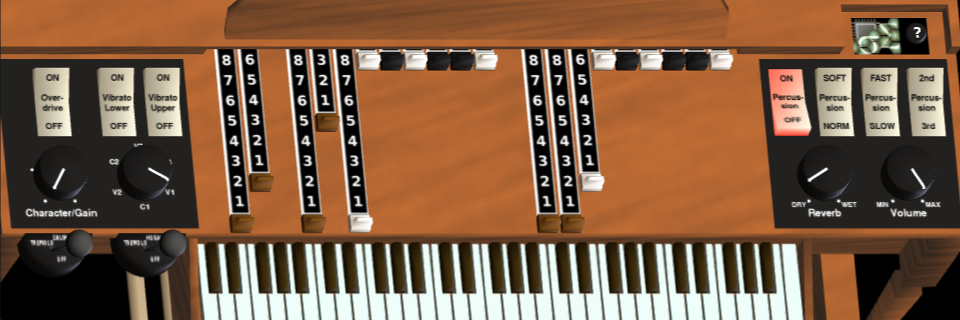A DSP Tonewheel Organ emulator.
setBfree is a MIDI-controlled, software synthesizer designed to imitate the sound and properties of the electromechanical organs and sound modification devices that brought world-wide fame to the names and products of Laurens Hammond and Don Leslie.
Binaries for Intel platform, GNU/Linux, OSX and Windows are available from
setBfree is also available on most Linux distributions.
- start jackd (see http://jackaudio.org, more below)
- run
setBfreeUIfor the GUI version - run
setBfreefor the headless commandline application - or load the LV2 plugin "setBfree DSP Tonewheel Organ" in your favorite DAW
setBfree is available as 3 different variants:
- standalone JACK application with graphical user interface
- LV2 plugin (with optional GUI)
- commandline application
Run setBfree -h for a quick overview. setBfree --help will output a
lengthy list of available options and properties than can be modified.
setBfree is the synthesizer engine. It responds to MIDI messages (JACK-MIDI
or ALSA-sequencer) and outputs audio to JACK. The engine does not have any
graphical user interface (GUI). It is usually started from the commandline.
The GUI setBfreeUI is a standalone application that wraps the synth engine.
It provides both visual feedback about the current synth state as well as allows
to reconfigure and control numerous aspects of the organ.
The complete organ (incl. GUI), as well as individual parts (leslie, reverb, overdrive) are also available as LV2 plugins.
Examples:
setBfree jack.out.left="system:playback_7" jack.out.right="system:playback_8"
setBfreeUI
jalv.gtk http://gareus.org/oss/lv2/b_synth # LV2 in jalv-host
You'll want reliable, low-latency, real-time audio. Therefore you want
JACK. On GNU/Linux we recommend qjackctl to start the
jack-audio-server, on OSX jack comes with a GUI called JACK-pilot. On Windows use the
Jack Control GUI.
An excellent tutorial to get started with JACK can be found on the libremusicproduction website.
+--------+ /-----------\ /--------\
| | | | | |
MIDI | Synth- | | Preamp/ | | |
--=->| +--->| +--->| Reverb +--\
| Engine | | Overdrive | | | |
| | | | | | |
+--------+ \-----------/ \--------/ |
|
/---------------------------------------------/
|
| /--------\ Horn L/R /-----------\
| | +---------->| Cabinet +-----*--> Audio-Out Left
| | +---------->| Emulation +--\ |
\->| Leslie | \-----------/ | |
| +--------------------------|--/
| +--------------------------*-----> Audio-Out Right
\--------/ Drum L/R
Render diagram with http://ditaa.org/ A pre-rendered image is available in the doc/ folder.
Each of the stages - except the synth-engine itself - can be bypassed. The effects are available as standalone LV2 plugins which provides for creating custom effect chains and use 3rd party effects.
The preamp/overdrive is disabled by default, reverb is set to 30% (unless
overridden with reverb.mix, reverb.dry or reverb.wet). Note that a
stopped leslie will still modify the sound (horn-speaker characteristics,
angle-dependent reflections). Bypassing the leslie (whirl.bypass=1) will mute
the drum-output signals and simply copy the incoming audio-signal to the horn
L/R outputs. The cabinet-emulation is an experimental convolution engine and
bypassed by default.
The LV2-synth includes the first three effects until and including the Leslie. The effects can be triggered via MIDI just as with the standalone JACK application. The cabinet-emulation is not included in the LV2-synth because it depends on impulse-response files which are not shipped with the plugin.
The Vibrato and Chorus effects are built into the synth-engine itself, as are key-click and percussion modes. These features are linked to the tone generation itself and can not be broken-out to standalone effects.
- native JACK application (JACK Audio, JACK MIDI)
- synth engine: variable sample-rate, floating point (beatrix is 22050 Hz, 16bit only)
- broken-out effects as LV2 plugins; LV2 wrapper around synth-engine
- built-in documentation
- Graphical User Interface, with MIDI-feedback and dynamically bound MIDI-CC
- fixed leslie aliasing noise
- state save/restore
- numerous bug fixes
see the ChangeLog and git log for details.
Install the dependencies and simply call make followed by sudo make install.
- libjack-dev - required - JACK is used for audio and MIDI I/O
- libftgl-dev, libglu1-mesa-dev, ttf-bitstream-vera - optional, recommended - openGL GUI
- lv2-dev - optional, recommended - LV2 plugins and GUI
- libcairo and libpango - optional, recommended - GUI for standalone Leslie/Whirl-speaker LV2
- libasound2-dev - optional - ALSA MIDI support
- help2man - optional - re-create the man pages
- doxygen - optional - create source-code annotations
- liblo-dev - optional - OSC used only in standalone preamp/overdrive app, mainly useful for testing.
- libzita-convolver-dev - optional, deprecated - libzita-convolver is used for cabinet-emulation
- libsndfile1-dev - optional, deprecated - libsndfile is needed to load IR samples for zita-convolver
Since version 0.8, alsa-sequencer support is deprecated and no longer enabled by
default (even if libasound is found), It is still available via ENABLE_ALSA=yes.
The Makefile understands PREFIX and DESTDIR variables: e.g.
make clean
make PREFIX=/usr ENABLE_ALSA=yes
make install ENABLE_ALSA=yes PREFIX=/usr DESTDIR=mypackage/setbfree/
Packagers: see debian/rules in the git-repository. LDFLAGS can be passed as is, CFLAGS should be specified by overriding the OPTIMIZATIONS variable. The packaging also includes a desktop-file to launch setBfree from the application-menu which is not included in the release.
Many thanks to all who contributed ideas, bug-reports, patches and feedback. In Particular (in alphabetical order): Dominique Michel, Fons Adriaensen, Jean-Luc Nest, Jeremy Jongepier, Julien Claasen and Ken Restivo.
